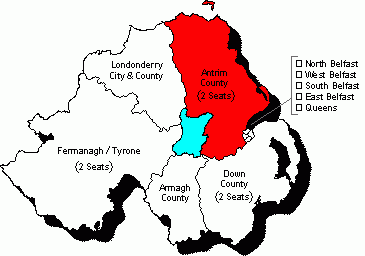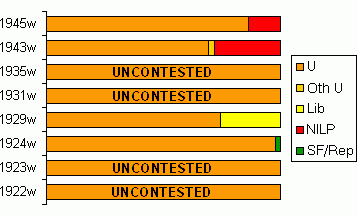

 |

|
| |
| |

|

|
| Map and diagram by Conal Kelly | |
This two seat constituency covered the north-eastern corner of Northern Ireland, incorporating all of county Antrim (with the notable exception of Belfast City). Established under the terms of the Government of Ireland Act 1920, the constituency replaced the single seat constituencies of East Antrim, Mid Antrim, North Antrim, and South Antrim. Unlike single seat constituencies, Antrim used the plurality-at-large (Block) voting system, where each voter selected up to two candidates, and the two candidates receiving the largest number of votes were the winners. Between 1922 and 1949 the constituency was represented by four different MPs (all Unionists). The general elections of 1922, 1923, 1931 and 1935 went uncontested. The declared winners in each case were the two Unionist nominees. The constituency had the lowest turn-out across Northern Ireland in the 1929 general election.
See also election results for North Antrim 1950-1970, 1973-1982, 1983-1992 and 1993-2007.
| U | Ind U | Lib | NILP | SF/Rep | |
| 1945w | 86.2% | 13.8% | |||
| 1943w-b | 69.4% | 2.3% | 28.3% | ||
| 1935w | * | ||||
| 1931w | * | ||||
| 1929w | 74.4% | 25.6% | |||
| 1924w | 98.0% | 2.0% | |||
| 1923w | * | ||||
| 1922w | * |
* The only candidates nominated for the 1922 and 1923 General Elections were Unionists Capt. Charles Craig and Maj. Robert O'Neill. The only candidates nominated for the 1931 and 1935 General Elections were Unionists Sir Joseph McConnell and Maj. Robert O'Neill. In each instance the candidates were therefore duly elected without a contest.
Unionist majority: 38,829; electorate: 134,528; votes cast: 49.4% (Note: each voter selects up to two candidates)
Following the death
of Campbell, the Unionist Party selected Samuel Haughton to stand alongside
O'Neill in defense of the two Antrim seats. Opposition came from Henry Holmes
who had been nominated by the Northern Ireland Labour Party (NILP). The NILP
had hoped to improve on their 1943 by-election result and while their tally
increased by over 1,000 votes, their overall share fell to just under 14%.
O'Neill and Haughton were returned to Westminster with massive majorities.
Henry Holmes would later leave the NILP and join the Unionist Party in 1949.
He was elected for Belfast Shankill in both the 1953 and 1958 Northern Ireland
general elections.
Unionist majority: 15,821; electorate: 135,795; votes cast: 22.5%
Following the death of
McConnell in 1942, a by-election was held the following February. The Unionist
Party selected John Campbell to defend the seat they had held since 1922.
Also challenging for the unionist vote was Independent candidate Reginald
Press. Rounding out the field was the Northern Ireland Labour Party (NILP),
who were contesting the constituency for the first time, with their candidate
Robert Getgood. Alarm bells had been ringing in Unionist Party headquarters
following the defeat of their candidate two days earlier by the NILP in West
Belfast, thanks in large part to a split unionist vote. There was concern
that with Press' presence on the ballot, there could be a repeat in Antrim.
In the end the worries were inflated and the Unionist Party candidate
romped home with almost 70% of the vote.
Campbell would be elected to the Northern Ireland House of Commons in a
by-election for Carrick in August 1943. He would later be killed in a plane
crash over the Adriatic in 1945, along with Robert Bernays, Liberal MP for
Bristol North.
Getgood was elected for Belfast Oldpark in the 1945 Northern Ireland general
election. Reginald Press had previously contested Belfast Windsor in the
1938 Northern Ireland general election, as an Ulster Progressive Unionist
Association candidate.
Unopposed Unionist Candidates.
Once again, the dominant position of the Unionist Party discouraged any potential opponents in Antrim. O'Neill and McConnell were again returned unopposed. Antrim was once of seven constituencies across Northern Ireland where the Unionist Party candidates went unchallenged.
Unopposed Unionist Candidates.
As was the case in 1922
and 1923, the Unionist Party faced no opposition in Antrim in 1931 and so
O'Neill and McConnell were returned to Westminster once more.
O'Neill would serve as the Chairman of the 1922 Backbench Committee from 1933
to 1939.
Unionist majority: 33,866; electorate: 123,474; votes cast: 58.1% (Note: each voter selects up to two candidates)
Following the retiremnent
of Craig, the Unionist Party nominated Joseph McConnell to join O'Neill on the
ticket. Their opposition would come from the Liberal Party who nominated George
Henderson and Robert Boyd. This was one of four constituencies being contested
by the Liberals in 1929. While the Liberal candidates managed to collectvely
gather some 25% of the vote, Unionist pairing were comfortably returned with
over 100,000 votes between them. At 58.1%, Antrim had the lowest turn-out across
Northern Ireland in the 1929 general election.
Sir Joseph McConnell's brother, Brian McConnell, would be elected to the Northern
Ireland House of Commons for South Antrim from 1951 to 1968. Henderson, running on
an Unbought Tenants' Association platform, had previously been elected to the
Northern Ireland House of Commons in the 1925 general election for Antrim (7 seats).
Boyd was the first president of the Northern Ireland Liberal Association.
Unionist majority: 58,250; electorate: 98,616; votes cast: 62.9% (Note: each voter selects up to two candidates)
Unlike the previous two elections, Craig and O'Neill would have competition in 1924, in the form of Sinn Fein candidate Patrick McCormick. McCormick was one of eight candidates fielded by Sinn Fein in the election. The result was a landslide for Craig and O'Neill, who had majorities in excess of 60,000 votes.
Unopposed Unionist Candidates.
As was the case in 1922,
Craig and O'Neill were the only candidates nominated in Antrim and were duly
elected without a contest once more. Seven other seats went uncontested in the
1923 general election in Northern Ireland. The sole nominee (and hence winner)
in each instance was the Unionist candidate.
O'Neill also stood successfully in the 1921 Northern Ireland general election
in Antrim (7 seats) and again in 1925. He served as the first speaker in the
Northern Ireland House of Commons. Craig was sworn as a member of the Privy
Council of Ireland in 1922.
Unopposed Unionist Candidates.
This was the
first election in the new two-seat Antrim constituency. The new
constituency replaced the single seat constituencies of East Antrim,
Mid Antrim, North Antrim, and South Antrim. Capt. Charles Curtis Craig
(brother of Northern Ireland's first Prime Minister, James Craig) had
represented South Antrim since the 1903 by-election. Hugh O'Neill
(uncle of Terence O'Neill, Northern Ireland's fourth Prime Minister) had
represented Mid Antrim since the 1915 by-election. As the only
nominees in this two-seat constituency, both were duly elected
without a contest.
O'Neill had unsuccessfully contested the Stockport constituency, as a
Conservative candidate in the 1906 Westiminster election.
See also:
Results from 1922 to 1949 for each seat: East Belfast | North Belfast | South Belfast | West Belfast | Antrim | Armagh | Down | Fermanagh and Tyrone | Londonderry | Queens University
Other sites based at ARK: ORB (Online Research Bank) | CAIN (Conflict Archive on the INternet) | Northern Ireland Life and Times Survey
Your comments, please! Send an email to me at nicholas.whyte@gmail.com.
Conal Kelly, 10 October 2007.
|
Disclaimer:©
Nicholas Whyte 1998-2004 Last Updated on Wednesday, 12-Jan-2005 12:12
|